NFL draft 2019: The colourful and controversial Combine questions faced by prospects
- Published
- comments

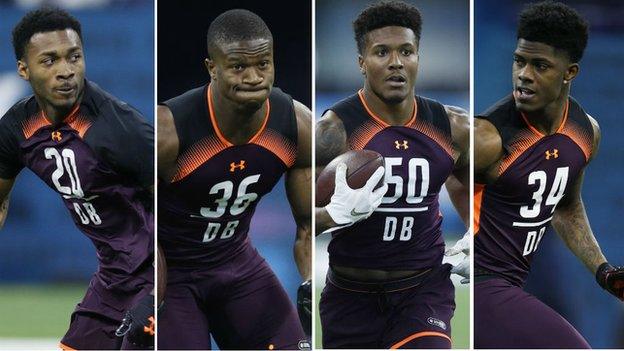
Justin Lane, Rock Ya-sin, Will Harris and Greedy Williams go through a physical workout at this year's Combine
You are in a hotel, the blandly luxurious type that specialises in draining corporate expense accounts.
Fresh out of university, you are here for a job interview.
It's a dream gig, with a wage far beyond those chased by your student peers, regular travel and a sprinkling of stardust.
There is a knot of nerves in your stomach. Rival candidates, primped and prepped, sit alongside.
You are called into a small meeting room. Four faces look up to greet you.
"If you were a fruit, what kind of fruit would you be?"
"Are you afraid of clowns?"
"How long can you stare without blinking?"
"Do you have both your testicles?"
"Is your mother a prostitute?"
"Are you gay?"
This is the NFL Combine - where the top college American football players prove themselves to NFL teams before being drafted into some of the richest locker rooms in sport.
Up to 335 young men attend the event in Indianapolis every February. Each goes through a medical and a battery of physical tests. NFL officials record their 40-yard dash time, the number of reps they manage on a 225lb (102kg) bench press and their furthest leaps, both vertical and horizontal.
There is also a verbal reasoning-style written examination - the Wonderlic - to assess players' cognitive ability.
It might ask, for instance, how many handshakes occur at a meeting of five people where each shakes every other person's hand once.
But the questions in the interview section, in which coaching staff from the NFL's 32 teams quiz prospects on playbooks and personal lives, can be the most puzzling.
Menelik Watson went through Combine in 2013 before being picked up in the second round by the Oakland Raiders a couple of months later.
"On interview night you have got these big function rooms and a load of tables. It is like speed dating, people moving across every 15 minutes," the Manchester-born offensive tackle tells BBC Sport.
"Some teams were in separate rooms.
"You would walk into some and the general manager would just ask you questions while the assistant general manager, the head coach and the defence or offensive coordinator would be quiet.
"In others everyone would be talking and you would be getting it from all angles.
"I went into a room and Tom Cable, now the Raiders offensive line coach but at the time at Seattle, was pushing my buttons.
"It was not abrasive or about family, but he kept asking weird antagonising questions.
"I got frustrated, showed some anger and he said 'oh I like that'.
"You are in a job interview and your boss is trying to wind you up before he is your boss. He actually gets you wound up and then enjoys it. It was then I realised this is going to be a weird experience."
In the wake of each Combine, tales of the weirdness seep out.
Some are quirky. In between talking through plays on a whiteboard, players might get pitched curveballs about what animal they see themselves as, the benefits of boxers and briefs or how many different ways they could use a brick in a minute.
Others cross lines not even approached in conventional job interviews.
At 2018's Combine Derrius Guice, now a Washington Redskins running back, claimed a team asked him about his sexuality. Two years previously, an Atlanta Falcons coach apologised for asking Eli Apple, now a New Orleans Saints cornerback, if he was gay. , external
This year, Texas cornerback Kris Boyd says he was asked to account for his testicles., external In 2016, Obum Gwacham was asked when he lost his virginity. In 2010, Dez Bryant was asked whether his mother was a prostitute, external on a visit to the Miami Dolphins facility.
DeMaurice Smith, the executive director of the players' union, called for any team asking questions about a player's sexuality to be banned from the Combine., external The NFL has emphasised that such inquiries are contrary to its workplace policies.
However, given that breaking Combine omerta is the type of behaviour to dent your draft stock, it is fair to guess numerous similar instances have gone unreported.
So, why do teams do it?
Neil Stratton runs Inside the League, which tracks the draft process and advises players on what awaits them at Combine.
"Some teams are pretty adversarial in their approach," he tells BBC Sport.
"They want to make a player feel uncomfortable because so many players have been through training and are able to homogenise their responses, talking without saying much.
"They hope, by getting under a player's skin, to get him to say something more revealing."
Menelik Watson's NFL trial
Before arriving at the Combine, the teams will have already done a fair bit of digging into their draft targets' pasts.
Colleges employ pro liaison coaches who field teams' enquiries into how players conduct themselves off the pitch, while each NFL team will also have a network of insiders to lean on.
Some employ specialists from outside football. Brian Decker used to select soldiers for the US Army's Special Forces, but now weighs up the character of potential players as the Indianapolis Colts' director of player development., external
For some teams, the side-swiping shock of an unexpectedly personal question is a final way to get behind a facade and find out if their multi-million dollar investment will wilt under pressure.
"These teams are specialists in chasing information that the players don't want them to have," adds Stratton.
"Generally there are very few questions they can ask that they don't already know the answer to.
"But there are still personnel on the ground who will try and gain an extra insight or advantage by hook or by crook."
The emphasis on upright, unflappable locker-room citizens seems odd when you consider history.
Teams have regularly thrived in spite of - often because of - some questionable characters.
The Dallas Cowboys won three Super Bowls in four years in the mid-nineties. Only afterwards did it emerge that the playing squad was a noxious mix of ego, rivalry, addiction and scandal., external
The Patriots, who have won three of the last five, have almost made it policy to pick up players rejected by other teams for off-field issues. , external
Might there be another reason for such emphasis on character?
NFL players recently found themselves on the front of America's ongoing culture war, when President Trump and some of the leagues' owners lined up against their right to protest against discrimination during the national anthem.
In 2011, once again, the players were collectively pitted against their employers, locked out of training facilities and barred from communicating with their coaches for weeks as a dispute over pay escalated to industrial action.
Watson says that the Combine itself fosters a similar 'us and them' mentality - "it is definitely not a rivalry, you share tips, give each other heads up about the sort of interviews you might have" - among draftees.
Could those questions be a covert test of how new recruits react to authority, confrontation and conflict? Will they toe the line or take a knee?
Not for Watson. He believes the interview is a justifiable way to predict how a player fits into a delicate locker-room ecosystem and stand up to the rigours of the league.
"Some teams' superstars might be big personality guys, character guys, out-going guys that you have to work with," he says.
"Maybe you have an offensive line group who are mature, older guys with families and the teams want to see if you could fit in with that group or if you are a young brash guy who likes to go out and party.
"They have to know what they are getting.
"A coach can't give you an opportunity because of the way you look and play, but not test you mentally.
"You are going to be injured, you are going to be tired, it is going to be week seven, week nine, week 12, and you are absolutely shot.
"You have broken two, three fingers, your knee is hurting, your ankle is hurting, your shoulder is hurting and mentally you don't know if you can get out there and compete.
"But you don't have any choice, you have to mentally convince yourself that you are ready to go. That is part of it.
"I don't know how I would have taken a question like the one Dez Bryant got and I don't know how that pertains to football exactly but there's definitely a lot of things that translate."
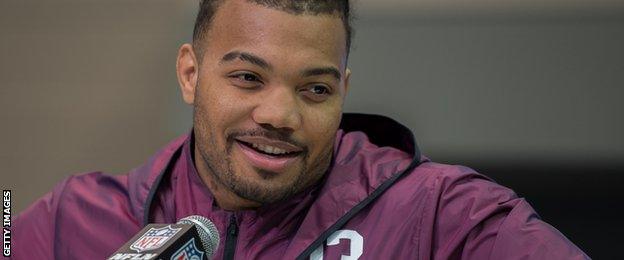
The NFL dropped an investigation into who asked Guice about his sexuality in 2018
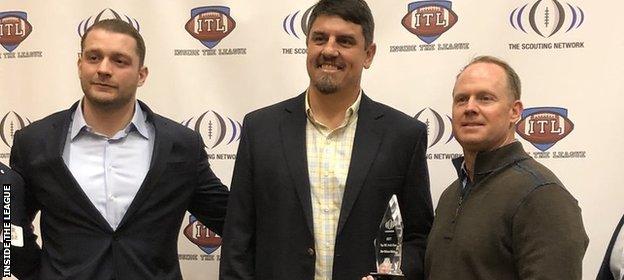
Neil Stratton (centre) presents Inside the League's award for the best 2017 NFL draft to the New Orleans Saints at the 2018 Combine
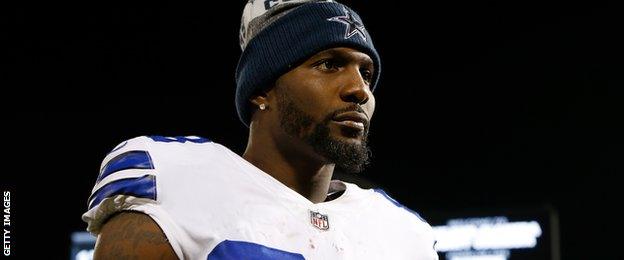
Bryant's mother was 15 when she gave birth to him and subsequently served time for drugs offences
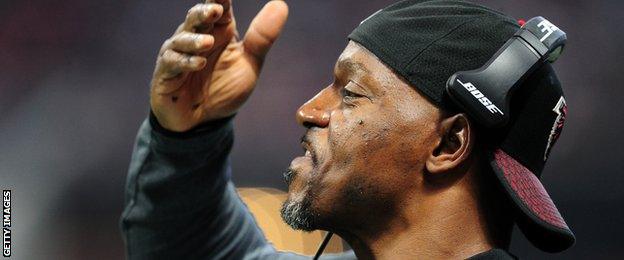
Marquand Manuel apologised after asking Eli Apple if he was gay at the 2016 Combine
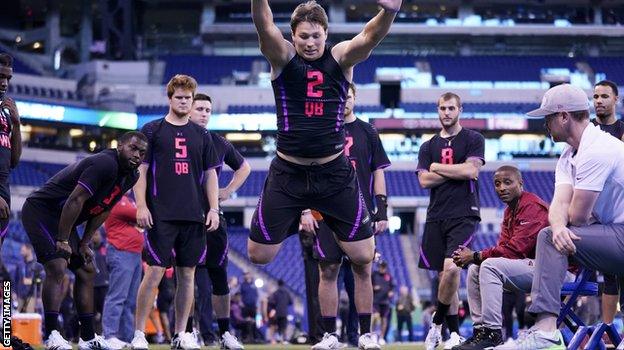
Quarterback Josh Allen competes in the 'broad jump' at the 2018 Combine
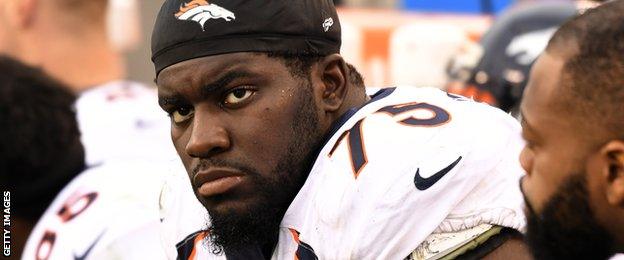
Watson is a free agent after leaving the Denver Broncos last year
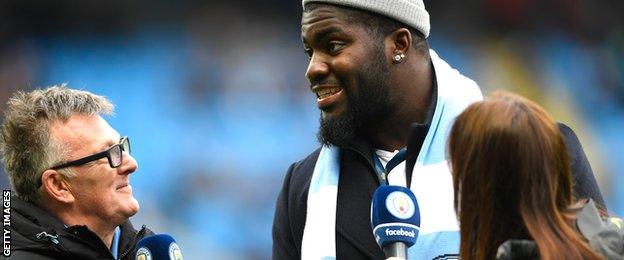
Watson, who grew up in Longsight, is interviewed on the pitch before a Manchester City game in February 2017